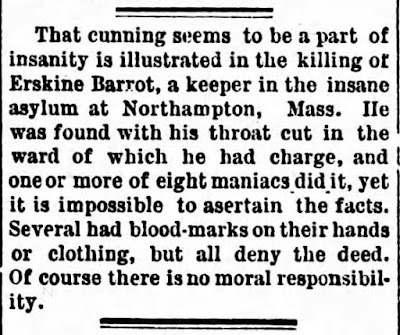by Kristin Holt
Image: Courtesy of Pinterest.
|
My personal comprehension of physical and mental "disabilities" is limited to severe chronic pain. And, understandably, the depression walking hand-in-hand with pain. Like white and milk, pain and depression are inseparable.
To compensate, I seek joy and light and laughter everywhere, including my writing. Most of my titles have a significant dollop of humor, along with essential story components like conflict.
While pain and depression are my only personal disabilities, I know a little more from close family bonds.
One beloved brother was born with a cleft lip and palate. One nephew has Down Syndrome. A sister-in-law suffered from Cystic Fibrosis (a genetic condition), as does one nephew. A former boyfriend was diabetic and required insulin by injection.
Are these defects? Are they disabilities? Is my constant state of severe pain a disability? Is it more politically correct to say conditions? Circumstances?
Image: Courtesy of Pinterest.
|

I've read many well-written books with "Other-Abled Characters" that have stuck with me for years. Pamela Morsi's Simple Jess, and many "combat-modified" heroes in contemporary military romantic suspense by a handful of truly gifted writers. I still remember poignant details from Cheryl St. John's Sweet Annie--(a fictional romantic tale of a young woman in a Victorian rolling chair)...and I read the book for the first time many years ago.
I've never attempted to write a character who rivaled Morsi's unforgettable Jess--a "simple" man. "Slow", some might say. Nor have I attempted a character like Annie who many referred to as "crippled". Or worse. In today's P.C. world, numerous descriptions are inappropriate, unkind, unnecessary, limiting, and frankly--cruel. I'm grateful my mother taught me better, expected better, insisted upon better.
While researching primary sources such as Victorian American newspapers and books, I consistently encounter terms, descriptions, and word choices inappropriate in today's world.
While researching primary sources such as Victorian American newspapers and books, I consistently encounter terms, descriptions, and word choices inappropriate in today's world.
The realm of mental illness in Victorian America was dangerous. The condition was rife with misunderstanding, frightening and abusive "treatments", asylums that once entered became a death sentence. I've read Nellie Bly (a daredevil reporter)'s historic account of an undercover incarceration in Blackwell's Island prison/hospital for prostitutes--who must be insane, otherwise, why would they choose prostitution? (Attitudes of Victorian America--not my own.)
As an author, including a character with physical or mental challenges, conditions, or limitations in a nineteenth century setting makes for a significant challenge. How can I write an historically accurate book that includes a special needs individual, remains true to history (vocabulary, word etymology, social viewpoints), and yet is suitable for today's readers? And most importantly, embodies my personal respect for all individuals.
Precisely like the Huntsman Disability Campaign (of about 2006), I refuse to 'dis' ability.
Image: Courtesy of Pinterest.
|
I wrote my first "disabled" Point of View character in my new release, The Gunsmith's Bride (available only within the anthology Gunsmoke & Gingham.
The story contains a double romance as the fifty-ish couple, George Hudson and Zylphia Speare, brought together by a correspondence courtship, and the youthful would-be step-siblings Morgan Hudson and Elizabeth Louise Speare. Reviewers have indicated they like the double-romance, and the difficult (yet unsteady) Mother (and stepmother-to-be) Zylphia Speare. By today's definition, Zylphia suffers from depression and emotional instability. In addition to suffering the recent death of her beloved husband, she has yet to recover from emotional wounds sustained in childhood. Zee isn't the primary heroine and though seriously flawed, the scenes in her point of view were designed mostly to explain her reasoning, motivation, behavior, and choices that otherwise would be seen as unsympathetic.
This anthology has been well received by readers, currently with 57 customer reviews on Amazon and an average of 4.9 stars out of 5. I'm grateful to have been included with four outstanding and highly rated authors. All titles in this set are Sweet ("Clean and Wholesome") Western Historical Romance novellas.
At the top, I shared my two most memorable reads of "other-abled" characters. Who are yours?
I write frequent articles (or view recent posts easily on my Home Page, scroll down) about the nineteenth century American West–every subject of possible interest to readers, amateur historians, authors…as all of these tidbits surfaced while researching for my books. I also blog monthly at Sweet Romance Reads, Sweet Americana Sweethearts, and Romancing the Genres.
Website | Email | Newsletter | Twitter | Pinterest | g+| Facebook Profile | Facebook Fan Page | Goodreads | BookBub | Amazon
Copyright © 2017 Kristin Holt LC











2 comments:
Kristin, I'm a little late to comment. A thoughtful post as usual. Seeking joy and happiness is a worthy goal and especially healing when we are in pain or have a 'new normal' to adjust to.
Jo Beverley's "Hazard" heroine has a limp due to a deformed foot.
Jennifer Ashley's "The Madness of Ian Mackenzie" hero was in a Victorian era mental institution.
A great essay about an important topic. One of the most memorable contemporary romances I've read is Catherine Anderson's "My Sunshine". The heroine suffered a head injury during an accident. The distinguishing characteristics of her head injury were well-presented, as were her adaptations to the injury and her confidence in living her life on her terms. In spite of that, the psychological barriers she had to a romantic relationship were also realistic, but not debilitating. So far, one of my favorite romance books.
I've read many books about military with PTSD or TBI, always wounded men. It's nice to see books about women too.
Post a Comment